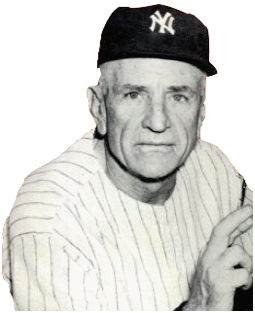
Also Read:
![]() Remembering Casey Stengel: You Could Look Him Up
Remembering Casey Stengel: You Could Look Him Up
![]() Casey
Stengel Part 2
Casey
Stengel Part 2
REMEMBERING CASEY STENGEL: The Complex, Two-Headed Casey
Part III
By Harvey Frommer

For those Yankee lovers and Yankee haters and all those in between who have responded to my first two pieces on Charles Dillon Stengel, for you to enjoy and write to me about is another in the series.
Sparing
no one
including himself, Casey Stengel was equally at ease using the back of
his hand
or the glad hand. Not unduly concerned about hurting a
player's (or anyone else’s feelings) by a sarcastic or sharp
criticism even in front of others, Stengel picked his times.
When
the club was losing, he was muted. He even praised players when they
were not
doing well. When the Yankees were winning, he became almost intolerably
edgy,
riding his players, trying to prevent a let-down.
“They know when they're losin' and feel bad
enough. But they'd better not fall asleep on me when they think
everything is
going la-de-dah,” he’d say.
He was hardest on the top talent like Mickey Mantle. Tolerance was reserved for those with lesser ability. He
did not
hesitate to replace these players as soon as he could. But he also
would not
denigrate them when they were on the scene, not much.
“Look at him,” Stengel said of Bobby Richardson. “He doesn't drink, he doesn't smoke, he doesn't chew, he doesn't stay out late, and he still can't hit .250. They say some of my stars drink whiskey, but I have found that ones who drink milkshakes don't win many ball games.”
One time, he went to the mound to remove a pitcher.
"I'm not tired," said the annoyed hurler.
"I'm tired of you," Stengel replied.
He
sat down next
to Bob Cerv in the Yankee dugout: "Nobody knows this, but one of us has
just been traded to
Charley
Murdock,
an announcer for Radio Station WRVA in
"Ask the players," barked Casey, "Don't ask me. I got no time for broadcasting. I'm managing a ball club here."
A
Stengel gave him the full response treatment. “You're entitled to your opinion, But I'll tell you this. I needed an outfielder which when I saw the chance to get Slaughter I took it. It was his first time around on waivers and you don't think I'd have got him the second time around, do you? Also, I got four outfielders hurt, Cerv, Collins, Siebern, and Noren. If anything happens to Mantle, what happens to me then? Also you got to remember Hunter comes through pretty good at short so I don't need Rizzuto. Now wait a minute, wait a minute here.”
The legendary Roger
Kahn covered the Yankees for a time and got a close look at Casey in
action.
“We flew back from
“And Stengel said: ‘Do
you choke up on that fucking microphone?’
“And then he turned
around, dropped his pants, scratched his buttocks and kept talking. Later Stengel explained to me: ‘We've gotta
put a stop to them terrible questions. When I said ‘Fuck' I ruined his
audio
and when I scratched my ass I ruined his video."
Players had mixed feelings about Stengel. Clubhouse meetings could last an hour or more with Casey motor-mouthing it non-stop.
“He confused a lot of players,” Rizzuto said. “He had two tempers, one for the public and writers, and one for the players under him. The players were frequently dressed down in the dugout and clubhouse. He could charm the shoes off you, if he wanted to, but he could also be rough.”
About the Author
Written by acclaimed sports author and oral historian Harvey Frommer, with an intro by pro football Hall of Famer Frank Gifford, When It Was Just a Game tells the fascinating story of the ground-breaking AFL-NFL World Championship Football game played on January 15, 1967: Packers vs. Chiefs. Filled with new insights, containing commentary from the unpublished memoir of Kansas City Chiefs coach Hank Stram, featuring oral history from many who were at the game-media, players, coaches, fans-the book is mainly in the words of those who lived it and saw it go on to become the Super Bowl, the greatest sports attraction the world has ever known. Archival photographs and drawings help bring the event to life.
Dr.
Harvey
Frommer is in his 39th year of writing books. A noted oral historian
and sports
journalist, the author of 42 sports books including the classics:
best-selling
“New York City Baseball, 1947-1957″ and best-selling “Shoeless Joe and
Ragtime
Baseball,” his acclaimed Remembering Yankee Stadium was published in
2008 and
best-selling Remembering Fenway Park was published to acclaim in 2011.
Frommer mint condition collectible sports books autographed and discounted are available always from the author.
FROMMER SPORTSNET (syndicated) reaches a readership in the millions and is housed on Internet search engines for extended periods of time.